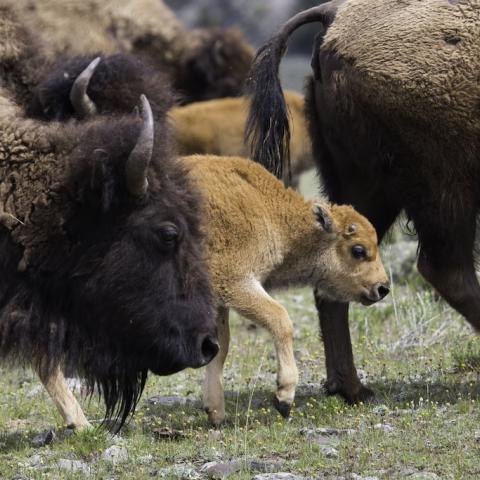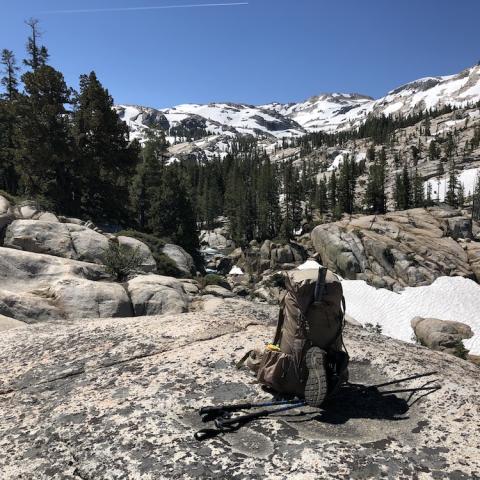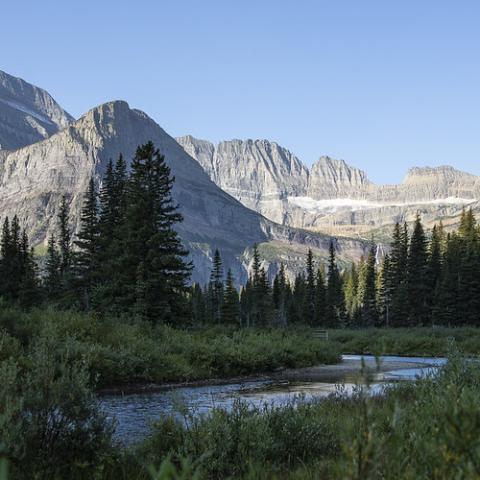
A judge has ordered the U.S. Fish and Wildlife Service to rethink its decision not to provide Endangered Species Act protection for wolverines/NPS
A federal judge has determined the U.S. Fish and Wildlife Service erred by not fully considering climate-change impacts and genetic isolation when it decided wolverines did not need Endangered Species Act protection.
On the first point, U.S. District Judge Dana Christensen agreed with conservation groups and individuals that "the Service ignored the best available science by demanding better science" when it came to climate change and the impact warmer winters would have on the species.
After recounting the biological needs of wolverines, calling the species "a relic of the Northern Hemisphere's last Ice Age, and it survives in very low numbers in those limited areas in the contiguous United States where ice age-like conditions persist," the judge agreed with the plaintiffs that "(T)he wolverines' sensitivity to climate change, in general, cannot really be questioned. In fact, many believe, similar to the polar bear, that the wolverine may serve as a land-based indicator of global warming."
And while he said that alone doesn't merit the species for ESA listing, as he went into detail on the case he reached the conclusion that the Fish and Wildlife Service had indeed erred in determining the wolverine did not deserve listing and ordered the agency to re-examine the issue.
The matter goes back roughly three years. In February 2013, the Fish and Wildlife Service proposed to list the wolverine as a threatened species under the Endangered Species Act after the agency's biologists concluded global warming was reducing the deep spring snowpack pregnant females require for denning.
But, according to the conservation groups at the time, "after state wildlife managers in Montana, Idaho and Wyoming objected, arguing that computer models about climate change impact are too uncertain to justify the proposed listing," Noreen Walsh, director of the agency's Mountain-Prairie Region, which includes Wyoming and Montana, ordered her agency to withdraw the listing. The reversal came despite confirmation by a panel of outside experts that deep snow is crucial to the ability of wolverines to reproduce successfully, the groups said.
In dismissing arguments that climate change might adversely impact wolverines, Fish and Wildlife Service officials claimed that future predictions of snowpack decline "were too coarse," and because not enough is known about why wolverines den in deep snow.
The judge figuratively shook his head at that rationale when he ruled Monday.
"...if evidence shows that wolverines need snow for denning purposes, and the best available science projects a loss of snow as a result of climate where and when wolverines den, then what sense does it make to deny that climate change is a threat to the wolverine simply because research has yet to prove exactly why wolverines need snow for denning? "he questioned. "There is near universal agreement that wolverines require deep snow for reproductive denning purposes. The Service acknowledged the correlation in the Withdrawal.
"...if ever there was a species for which conservation depends on foregoing absolute certainty, it is the wolverine. For these reasons, the Court finds the Service's treatment of wolverine denning requirements in the Withdrawal to be arbitrary and capricious."
On the matter of genetic isolation, the court raised points the Fish and Wildlife Service cited, and then rejected, as to why genetic isolation is a threat to wolverine populations.
"The Service acknowledged inappropriately low short- and long-term effective population sizes for the wolverine, as well as a documented loss of genetic diversity with no realistic hope of genetic infusion from Canadian populations," Judge Christensen pointed out. "Rather than explain why these circumstances are no cause for alarm, the Service simply stated there was no threat because there was no data confirming a threat. In light of the tremendous difficulty associated with studying the wolverine, such conclusory treatment based on a dearth of information is impermissible under the (Administrative Procedures Act) and the (Endangered Species Act)."
At Defenders of Wildlife, Michael Senatore, vice president of conservation law for the organization, said the ruling moved wolverines "one step closer to getting the federal protection they’ve desperately needed for decades. Today’s decision reaffirms that the U.S. Fish and Wildlife Service ignored the best available science by denying them federal protections in 2014. We urge the Service to heed today’s ruling and move forward with a rule to list the species under the Endangered Species Act now.
“With an estimated 300 animals left in the lower-48 states, and substantial scientific evidence indicating that the species’ habitat is diminishing due to the effects of climate change, the wolverine clearly warrants protection under the Endangered Species Act. We’re pleased to see these assertions were validated today," he added in a prepared statement.
“Today’s win is a victory not just for wolverine but for all species whose fate relies on the scientific integrity of the Fish and Wildlife Service,” said Bethany Cotton, wildlife program director for WildEarth Guardians. “We call on the agency to stop playing politics and start living up to its mandate to protect our country’s most imperiled species.”
In his 85-page ruling, Judge Christensen noted the political aspects of the case.
"Why did the Service make the decision it did in the Proposed Rule, based on what it determined to be the best available science, and reject that decision eighteen months later?" he wrote. "Based on the record, the Court suspects that a possible answer to this question can be found in the immense political pressure that was brought to bear on this issue, particularly by a handful of western states. The listing decision in this case involves climate science, and climate science evokes strong reactions."
The groups behind the lawsuit were the Center for Biological Diversity, Conservation Northwest, Friends of the Clearwater, Greater Yellowstone Coalition, Idaho Conservation League, Jackson Hole Conservation Alliance, Klamath-Siskiyou Wildlands Center, and Rocky Mountain Wild.
Wolverines have been spotted in Denali National Park, Yosemite National Park, Yellowstone National Park,Grand Teton National Park, Glacier National Park, and North Cascades National Park, among others. It's difficult to say just how many wolverines are wandering around the parks. Their extensive travels, sneaky scavenger-like maneuvering, and solo dwelling make it difficult for researchers to closely monitor their patterns.
In summing up his ruling, Judge Christensen wrote that, "No greater level of certainty is needed to see the writing on the wall for this snow-dependent species standing squarely in the path of global climate change. It has taken us twenty years to get to this point. It is the undersigned's view that if there is one thing required of the Service under the ESA, it is to take action at the earliest possible, defensible point in time to protect against the loss of biodiversity within our reach as a nation. For the wolverine, that time is now."




 Support Essential Coverage of Essential Places
Support Essential Coverage of Essential Places







Add comment